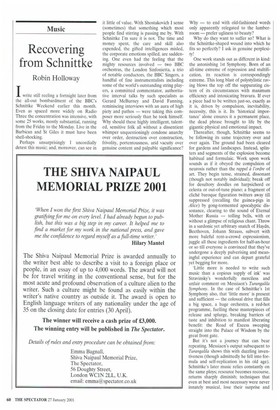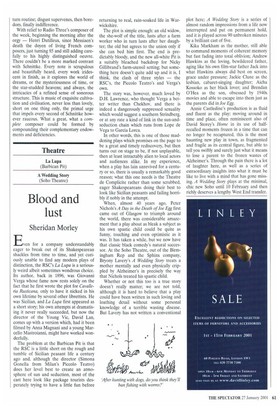Recovering from Schnittke
Robin Holloway
Iwrite still reeling a fortnight later from the all-out bombardment of the BBC's Schnittke Weekend earlier this month. Even as spaced more widely on Radio Three the concentration was intensive, with some 25 works, mostly substantial, running from the Friday to the Monday. Live in the Barbican and St Giles it must have been shell-shocking.
Perhaps unsurprisingly I uncordially detest this music; and, moreover, can see in it little of value. With Shostakovich I sense (sometimes) that something which most people find stirring is passing me by. With Schnittke I'm sure it is not. The time and money spent, the care and skill also expended, the gifted intelligences misled, the corporate emotions spilled, are saddening. One even had the feeling that the mighty resources involved — two BBC orchestras, the London Sinfonietta, a trio of notable conductors, the BBC Singers, a handful of fine instrumentalists including some of the world's outstanding string players, a committed commentator, authoritative interval talks by such specialists as Gerard McBurney and David Fanning, reminiscing interviews with an aura of high piety and pathos — were taking this composer more seriously than he took himself. Why should these highly intelligent, talented, sensitive folk all without a dissentient whimper unquestioningly condone anarchy over order, destruction over construction, frivolity, portentousness, arid vacuity over genuine content and palpable significance Why — to end with old-fashioned words only apparently relegated to the lumberroom — prefer ugliness to beauty?
Why do they want to suffer so? What is the Schnittke-shaped wound into which he fits so perfectly? I ask in genuine perplexity!
One work stands out as different in kind: the astonishing 1st Symphony. Born of an all-time extreme of repression and stultification, its reaction is correspondingly extreme. This long blast of polystylistic raving blows the top off the suppurating cistern of its circumstances with maximum efficiency and intoxicating bravura. If ever a piece had to be written just-so, exactly as it is, driven by compulsion, inevitability, necessity, this is it. Its 'historical importance' alone ensures it a permanent place, the dead phrase brought to life by the gigantic physical and emotional impact.
Thereafter, though, Schnittke seems to be following its same trajectory over and over again. The ground had been cleared for gardens and landscapes. Instead, splinters and segments of the explosion become habitual and formulaic. Work upon work sounds as if it obeyed the compulsion of neurosis rather than the rappel a l'ordre of art. They begin tense, strained, dissonant (though not notably individual); break off for desultory doodles on harpsichord or celesta or out-of-tune piano; a fragment of cliché baroque figuration twitters away till suppressed (recalling the guinea-pigs in Alice) by gong-tormented apocalyptic dissonance, clearing to the sound of Eternal Mother Russia — tolling bells, with or without a glimpse of religious chant. Throw in a sardonic yet arbitrary snatch of Haydn, Beethoven, Johann Strauss, subvert with more baleful rent-a-crowd expressionism, juggle all these ingredients for half-an-hour or so till everyone is convinced that they've undergone a deeply pulverising and meaningful experience and can depart grateful yet begging for more.
'Little more is needed to write such music than a copious supply of ink' was Stravinsky's wonderfully merciless and unfair comment on Messiaen's Turangalila Symphony. In the case of Schnittke's 1st Symphony also, that 'little more' is present and sufficient — the colossal drive that fills a big space, a huge orchestra, a red-hot programme, fuelling these masterpieces of release and splurge, breaking barriers of taste and inhibition to manifest liberating benefit: the Road of Excess sweeping straight into the Palace of Wisdom by the great front gate.
But it's not a journey that can bear repeating. Messiaen's output subsequent to Turangalila shows this with dazzling inventiveness (though admittedly he fell into formula and self-replication in his old age). Schnittke's later music relies constantly on the same ploys; resource becomes recourse, returns sharply diminish; techniques that even at best and most necessary were never innately musical, lose their surprise and turn routine; disgust supervenes, then boredom, finally indifference.
With relief to Radio Three's composer of the week, beginning the morning after the orgy — Henri Dutilleux, since Messiaen's death the doyen of living French composers, just turning 85 and still adding carefully to his highly distinguished oeuvre. There couldn't be a more marked contrast with Schnittke. Every note is scrupulous and beautifully heard, every work iridescent in finish, as it explores the world of dreams, or the mysteriousness of time, or the star-studded heavens; and always, the intricacies of a refined sense of sonorous structure. This is music of exquisite cultivation and civilisation, never less than lovely, short on one thing only, the primal urge that impels every second of Schnittke however raucous. What a great, what a complete composer could be formed by compounding their complementary endowments and deficiencies.























































































 Previous page
Previous page